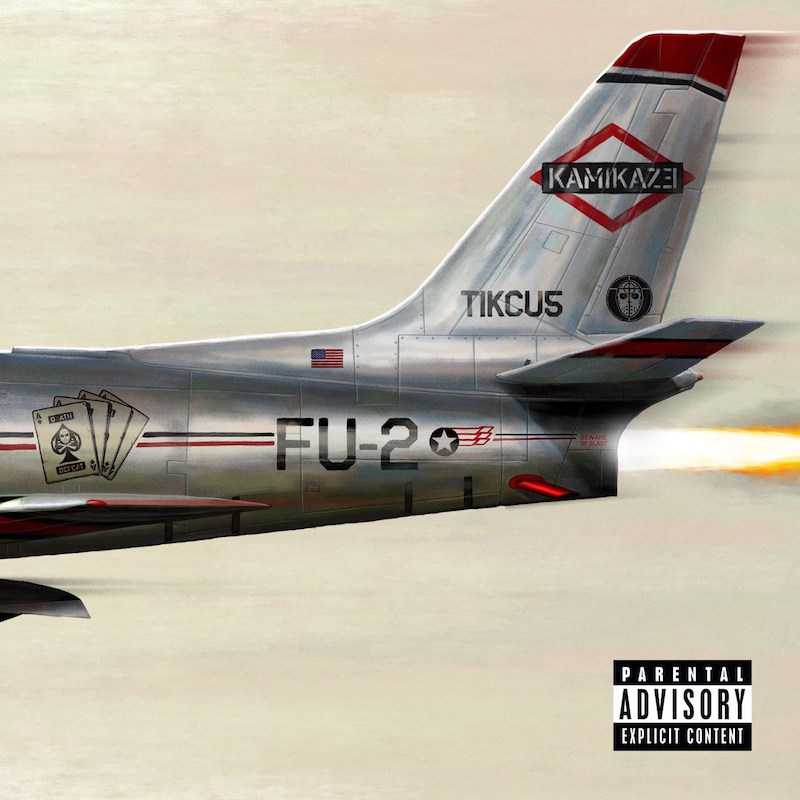Eminem : Kamikaze

Maybe the most miserable moment on Kamikaze, Eminem’s tenth studio album and second in as many years, comes on its tenth track, “Fall.” Atlanta skronk-rap wizard Mike Will provides an honestly gorgeous beat with a spare, pinball-ing synth lead and 808s that split the difference between trap and boom-bap; Justin Vernon does his Auto-Tuned falsetto and murmurs the album’s best hook; and then Eminem decides that even though he’s a straight, white, cisgender, 45-year-old man, it’s still cool for him to call Tyler, the Creator, who didn’t like Em’s (terrible) 2017 single, “Walk on Water,” a faggot. It’s a line that stings for a lot of reasons, but mostly because Tyler recently came out, however tenuously, as a gay man.
Look: Eminem has made a career out of clinging to his adolescence. That’s always been part of what draws people to him. Revival might have been an overlong, schlocky mess of an album, but it had a few moments where it felt like Em was maturing; the sober recollections of his addiction on “Castle” and “Arose,” and especially the caustic anti-Trump anthem, “Like Home,” on which Em offered support to disenfranchised trans veterans. Even if the music wasn’t there, it was clear that Em was trying to take a stand. But backlash hit, as it always does, and even if Revival sold well—and it did—Em took the dearth of critical acclaim for the project as a loss.
So this backslide is both disappointing and entirely predictable. Eminem’s a reactionary—he always has been—and time was that his cultural hyper-awareness was a strength. But Em’s 45 now, and his single-minded focus on and inability to accept criticism of his own work is honestly childish at this point. It was childish in 2000, too, but 2000’s Eminem at least seemed like he was having fun, being the batshit provocateur he wanted to see in the world, finding out what people didn’t want him to say and then screaming it at the top of his lungs. But at some point we all stop being the one brash enough to speak truth to power and become a kid playing the Penis Game in a park.
It’s funny, too, because for as much as Eminem claims to be “the greatest in the world,” he doesn’t seem to like rap very much. Aside from a chosen few, Eminem regards rap with contempt, taking potshots at everyone from Lil Yachty to Machine Gun Kelly. And that’d be fine, I guess, except he can’t seem to understand why he doesn’t get to be the biggest star in the world. There’s a moment on “Fall” where Eminem writes, “Somewhere some kid is bumpin’ this while he lip-syncs in the mirror / That’s who I’m doin’ it for, the rest, I don’t really even care.” But it just rings entirely false. This album is for Eminem. He’s written that Kamikaze is a second try after Revival, that he “tried not 2 overthink this 1,” but it feels far less like a corrective than it does like a punishment for the listeners who’ve moved past him. He bites flows from Migos and Playboi Carti so he can say how much he hates them; he entices Tay Keith to twist up the “Look Alive” beat and proves that he can make any song no fun if he tries hard enough.
The defense for Eminem records, ever since sometime around Recovery in 2011, has been that Eminem is great at rapping, nearly unmatched. But I don’t buy it. There are so many ways to be good at rapping. What Eminem is really great at is spitting a lot of really intricate lines really quickly. He’s great at the physical act of rapping. But it’s just so utterly joyless. He sounds miserable on this album, gritting his teeth, rhyming nearly every word with the next, never losing his breath, trying with all his might to prove that he’s still got it. Plus, even with him being as polysyllabic as possible, he’s still prone to rapping the corniest shit in the world, laboring over internal rhymes and connecting dots just so he can call the Grammys leeches. His style’s become harsh, pummeling, militaristic. He’s got incredible command, but his once-playful voice has curdled into a strained perma-yell. It’s tough to listen to, even at a merciful-for-Eminem 45 minutes.
To say this is its own cliché in late-period Eminem criticism, but Eminem used to love rapping so much. The one great through-line of his original run, aside from himself, is how much fun this kid seemed to be having realizing that all these words could rhyme together. Pick any run from The Slim Shady LP and there’s at least one oh-shit rhyme scheme (a personal favorite: “class-clown freshman dressed like Les Nessman / fuck the next lesson, I’ll pass the test guessing”). There used to be jokes on Eminem albums. The closest he comes on this record is a skit where he threatens to kill a Yahoo News commenter for making fun of his rhymes. It’s a telling moment, mostly for how sad it is. Imagine Eminem sitting at his computer, reading bad reviews, screaming at the screen.
The only song on this record that feels genuinely meaningful is “Stepping Stone,” a mea-culpa from Em to his old friends in D12. The song’s beat isn’t great, an unfortunate retreat to the soft-rock tendencies that plagued Recovery, but Em manages to elevate it by looking outside himself and honestly evaluating his actions. It’s the kind of record he ought to be making as an elder statesman—reflective, thoughtful, un-bitter. No one needs to hear him rap about hitting a woman “with a Louisville Slugger” or talking about how bitches “gotta be so extra.” Maybe he ought to take Tyler’s advice and log off for while. Or maybe he ought to just grow up.
Similar Albums:
 Drake – Views
Drake – Views
 Jay-Z – Magna Carta Holy Grail
Jay-Z – Magna Carta Holy Grail
 Dr. Dre – Compton
Dr. Dre – Compton

